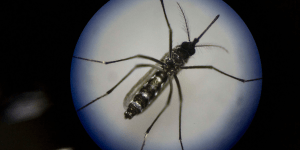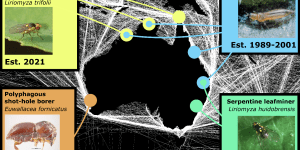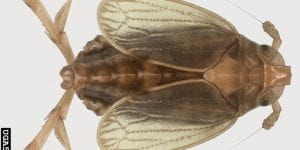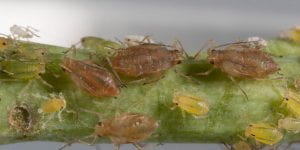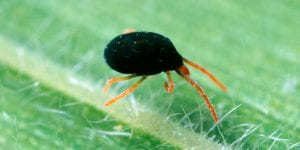Tag: pests
-
Are you a mosquito magnet? Here’s why and what you can do about it
Dr Perran Stott-Ross and Holly Hyojung Kang This article was first published on Pursuit. Read the original article. Mosquitoes are some of the most effective hunters on the planet. They can track you down at great distance by sniffing out the air you breathe. Once they find exposed skin, they use their needle-like proboscises to […] -
Scientists and government agencies are targeting mosquitoes with bacteria
by Nancy Endersby-Harshman and Ary Hoffmann This article was first published on Pursuit. Read the original article Dengue fever is one of the most common tropical diseases in the world, affecting several million people every year. It is transmitted by mosquitoes, particularly a species known as Aedes aegypti, the yellow fever mosquito. Dengue is a […] -
Q&A: Victoria’s monster mosquito explosion
By Véronique Paris, Nick Bell and Professor Ary Hoffmann This article was first published on Pursuit. Read the original article. It’s evening and you’re just starting to relax after a hectic day. Just as you do, you hear the unmistakable high whine of a circling mosquito. It’s something most of us are used to in […]blogs.unimelb.edu.au/pearg/2022/11/24/qa-victorias-monster-mosquito-explosion
-
New DECRA projects coming soon! 2/2
Molecular biosecurity: Genomic databanks for managing invasive pests – Tom Schmidt Insect pests frequently establish invasions in Australia or are detected as incursions at borders, but little is often known about where they’ve come from or how best to manage them now they are here. One way to investigate these questions is to sequence and […]blogs.unimelb.edu.au/pearg/2022/09/27/new-decra-projects-coming-soon-2-2
-
A self-spreading bacterial infection in an agricultural pest that stops the pest from spreading plant viruses
Words: Ary Hoffmann Banner image: Natasha Wright, licensed under Creative Commons Attribution 3.0 License. In Asia, one of the most damaging pests of rise is the brown planthopper, Nilaparvata lugens. This pest damages plants directly but more importantly it acts as a vector for damaging plant viruses, including the “rice ragged stunt virus” (RRSV). This […] -
Uninvited guests in your groceries
Words, illustraions and photos: Marianne CoquilleauMarianne Coquilleau With spring coming our way, gardens come to life and with it their many inhabitants. It’s no surprise then to find small caterpillars, aphids and other insects while washing your vegetables and fruits, especially if you source your vegetables locally or pesticide-free sources. You might then also notice […]blogs.unimelb.edu.au/pearg/2020/09/17/uninvited-guests-in-your-groceries
-
The resistance advantage – a field genetic background is important for survival of our Wolbachia mosquitoes in Malaysia and reduction of dengue
Banner image: Nancy with scientists from the Wolbachia dengue program at the Institute for Medical Research, Ministry of Health, Kuala Lumpur, Malaysia. Words and photos: Nancy M. Endersby-Harshman Our paper published two weeks ago in Insects is the result of a research collaboration between PEARG at the University of Melbourne, the Institute for Medical Research […] -
Targeting the bacteria inside insects for improved pest management
This article was first published on Pursuit. Read the original article Francesca Noakes and Professor Ary Hoffmann Any home gardener knows of the long-running battle against insect pests. The little critters that sneak into your garden beds and strip leaves are irritating among prized kale, but for farmers these tiny pests can have devastating economic […] -
New Pursuit article – Have resistance, will travel
This article was first published on Pursuit. Read the original article here. Authors: Dr Nancy Endersby-Harshman, Dr Qiong Yang, Dr Tom Schmidt and Professor Ary Hoffmann Around the world, pest insects – like mosquitoes – often become resistant to the insecticides meant to control them, causing problems for agriculture and public health. Resistance in multiple populations […]blogs.unimelb.edu.au/pearg/2020/05/28/new-pursuit-article-have-resistance-will-travel
-
Looking for a funded PhD or MPhil scholarship?
The Australian Grains Pest Innovation Program (AGPIP) is offering 4 fully funded scholarships at the University of Melbourne for potential PhD or MPhil students interested in cutting-edge science, environmental sustainability and agricultural innovation. AGPIP is a collaboration between the PEARG and cesar. The program is aimed at improving the sustainability of invertebrate pest management practices […]blogs.unimelb.edu.au/pearg/2020/04/06/looking-for-a-phd-or-mphil-scholarship
Number of posts found: 24

